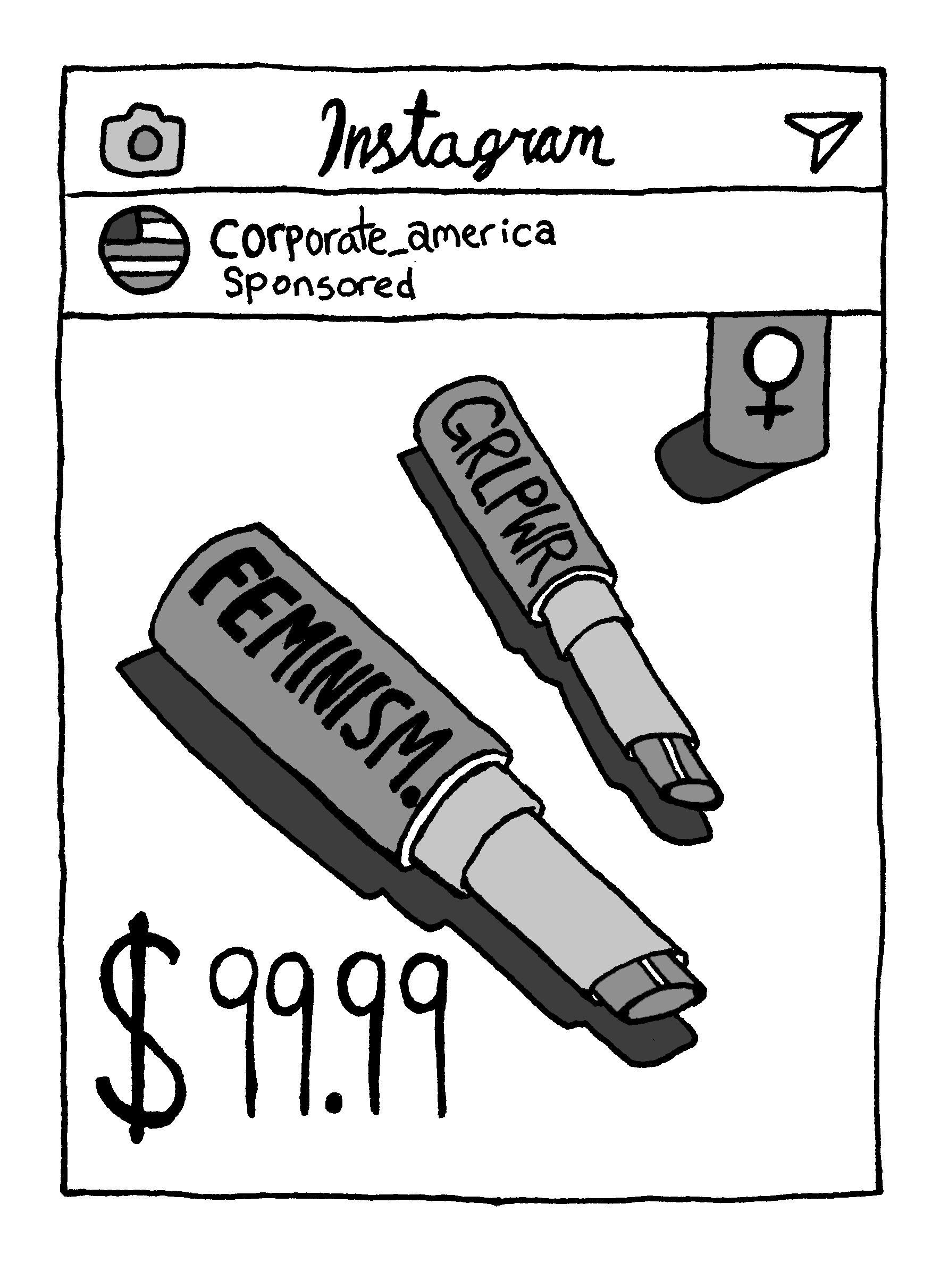Corporate feminism undermines the larger goal of equality
September 8, 2017
 This
piece represents the opinion of the author
.
This
piece represents the opinion of the author
.
Because I inherited my mother’s aversion to makeup, I was an easy target for Glossier’s stunningly effective marketing scheme. Rather than use Kendall Jenner’s heavily contoured and enviously symmetrical face for ads, the brand instead tends to recruit “everyday” women to model its minimalist line of makeup on its Instagram account.
Like true Glossier super fans, my friend Camille and I made the necessary pilgrimage to the company’s Manhattan penthouse showroom this summer. We arrived just before closing time and found that hordes of like-minded young women, who had also learned about the brand and its showroom on Instagram, demolished virtually all of the sample products. Despite this small letdown, the room’s ubiquitous millennial pink décor and sleekly packaged products nonetheless seduced Camille and me into making purchases.
I am unafraid to admit that I subscribe to Glossier’s religion devoted to the pursuit of perpetually dewy, glowing skin, and appreciate their dedication to showcasing their products on a racially diverse cast of models. But it is difficult to overlook Glossier and other brands’ online propagation of a corporate, exclusive brand of feminism.
The brand’s appeal to the upwardly mobile millennial woman stems from its origin story. Behind the rapid online success of Glossier is founder and CEO Emily Weiss. Media coverage of her meteoric rise to success emphasizes her entrepreneurial ingenuity, seen in her ability to sell her product without a chain of brick and mortar stores. Weiss has been positioned as the feminist answer to the male-dominated startup world of Silicon Valley, where accounts of rampant misogyny are tarnishing success stories like those of Uber and Google.
Glossier, with its visually appealing Instagram aesthetics and clever slogans, invites customers to use their relatively pricey products to become one step closer to becoming like Weiss: a glowing, put-together and career-oriented young woman. While other makeup brands sell empowerment through a full face of makeup, Glossier’s ad campaign smartly peddles confidence achieved by the usage of simple products that do little to alter one’s natural appearance.
Glossier is far from the first big name to use the profitable combination of social media and the feeling of female empowerment to sell its products. A quick Google search shows that Forever 21 and Urban Outfitters are both selling shirts with “Girl Power” emblazoned across the front online. In 2014, Emma Watson and other celebrities, in partnership with Elle UK and The Fawcett Society came out with a viral social media ad campaign wherein the stars wore t-shirts proclaiming, “This Is What A Feminist Looks Like.”
There is undeniable value in brands advancing progressive causes. Companies may distill and oversimplify certain issues with pithy slogans and trendy imagery, but they are far more capable of resonating with people in ways that radical activists simply cannot, thanks to their vast financial resources and massive online reach. But when companies sell female empowerment they are giving society feminism with barriers to entry. For a certain price, one can put on a shirt that announces that they are “woke.” And for another price, a woman can confidently sport Glossier’s products, seemingly freed from societal expectations of a skillfully made up face. But by implying that one can buy their way into being a feminist, these brands normalize the continued exclusion of underprivileged women from feminist discourse.
Moreover, by purchasing these products (many of which were mass-produced by underpaid women in deplorable conditions) we are being woefully hypocritical. And knowing that this planet is continually deteriorating at the hands of exploitative corporations, we must demand more from companies that choose to take activist stances in order to sell their products. No amount of aesthetically pleasing visuals on our Instagram feeds should convince us to put our faith in this inaccessible and unsustainable means of achieving progress.
Comments
Before submitting a comment, please review our comment policy. Some key points from the policy:
- No hate speech, profanity, disrespectful or threatening comments.
- No personal attacks on reporters.
- Comments must be under 200 words.
- You are strongly encouraged to use a real name or identifier ("Class of '92").
- Any comments made with an email address that does not belong to you will get removed.


Interesting take on the what it means to buy into this brand, but this article is really flat.
This author offers no evidence to back up their claim that the brand is exploiting the people manufacturing their products. Any quotes? Anyone on record? What is the source of that information? This just seems like a lie and bad reporting.
Also, the claim about prices.. the author should do some benchmarking before making this inaccessibility claim. One can argue that the range is pricier than some mass market/drugstore buys, but those are far from premium prices. This doesn’t show much research.. just calling it inaccessible doesn’t put it into any context. Should companies with these kind of values offer their products at cost?
It would have been more interesting to share examples or propose theories on how a brand can authentically stand for positive values while being successful/profitable in a capitalist economy. Or make an argument to smash capitalism and replace it with a system than can allow companies to stand for their ethical values without compromise. Whatever…